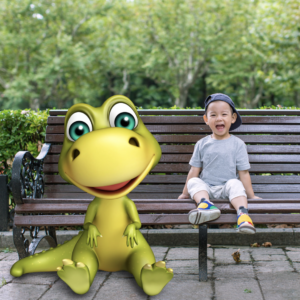Food allergy affects over 3 million Canadians, including almost 600,000 children. Researchers are committed to better understanding how to prevent, diagnose, treat, and eventually, cure this medical condition. Learn how you can participate in research studies.
Research study – Call for participants: Children with peanut allergy

A research study is underway across North America. They are seeking children aged 4-7 years who have been diagnosed with peanut allergy and are currently following a strict peanut-free diet.
The study is testing an investigational drug patch to learn how well it works and how safe it is in children with peanut allergy. The purpose of the patch is to potentially desensitize a person with peanut allergy by repeated exposures to very small amounts of peanut via the skin.
Following is an announcement from the research team and a listing of the Canadian study sites. You can also visit VitesseAllergyStudy.com for more details and view their FAQ sheet.
Please share with others whose children have peanut allergy.
From the research team:
Now Enrolling: The VITESSE Phase 3 Study for Peanut Allergy
The VITESSE phase 3 clinical research study is looking for children 4 to 7 years of age who have been diagnosed with peanut allergy and are currently following a strict peanut-free diet. Study doctors are testing an investigational drug patch (also called study drug patch) to learn how well it works and how safe it is in children with peanut allergy.
What should I know about the VITESSE study?
- To be eligible for this study, participants must be*:
- 4 to 7 years of age
- Diagnosed with peanut allergy
- Currently following a strict peanut-free diet
*Other inclusion/exclusion criteria will apply.
- This study will consist of at least 12 study visits and 5 phone calls over a period of approximately 58 weeks (about 1 year)
- Participants will be randomly assigned (by chance) to receive the study drug patch or placebo patch (looks like the study drug but contains no active drug). Participants will have about a 67% (2 in 3) chance of receiving the study drug patch and about a 33% (1 in 3) chance of receiving the placebo patch
- The health and safety of participants will be monitored throughout the study
- Participant data and information will be kept confidential according to applicable laws for clinical research studies
- Study participants will receive all study-related procedures and the study drug patch or placebo patch at no cost
To learn more about the VITESSE phase 3 study and eligibility criteria, please visit VitesseAllergyStudy.com or ClinicalTrials.gov (identifier: NCT05741476).
Study sponsored by DBV Technologies.
You can find the study sites involved at VitesseAllergyStudy.com. We’ve listed the Canadian sites for you below.
| Province | Study site |
|---|---|
| British Columbia | BC Children’s Hospital Dr. Edmond Chan 950 W 28 Ave. Vancouver, BC V5Z 4H4 Contact: Lianne Soller or Beverley Ojeaga at allergyresearch@cw.bc.ca |
| Manitoba | Manitoba Allergy Research Inc. Dr. Nestor Cisneros 633 Lodge Ave. Winnipeg, MB R3J 0S9 Contact: Shannon Cisneros at 204-958-6799 or shannoncisneros@me.com |
| Ontario | Halton Pediatric Allergy Dr. Douglas Mack 5500 North Service Rd., Suite 106 Burlington, ON L7L 6W6 Contact: Roselle De Guzman at 905-315-9543 or StudyCoordinatorOPARC@gmail.com |
| Hamilton Allergy Dr. Jason Ohayon 201-1685 Main St. West Hamilton, ON L8S 1G5 Contact: Tenzin Gyaltsen at 905-777-0088 or tenzin@hamiltonallergy.ca | |
| The Hospital for Sick Children Dr. Julia Upton 555 University Ave. Toronto, ON M5G 1X8 Contact: Alireza Berenjy at 416-813-7654 ext. 402897 or alireza.berenjy@sickkids.ca | |
| Ottawa Allergy Research Corp Dr. William Yang 2505 St. Laurent Blvd. Ottawa, ON K1H 1E4 Contact: Alvin Mendoza, RPN at 613-725-2102 ext. 261 or amendoza@yangmedicine.com | |
| Québec | CHU Sainte-Justine Dr. Philippe Bégin 3175 Chem. de la Côte-Ste-Catherine Montréal, QC H3T 1C5 Contact: Marie-Christine Auclair at 514-345-4931 ext. 3827 or marie-christine.auclair.hsj@ssss.gouv.qc.ca |
| Clinique Spécialisée en Allergie de la Capitale Dr. Remi Gagnon 2600 Boul Laurier, Bureau 880 Québec, QC G1V 4W2 Contact: Maika L’Hébreux at 418-780-0881 ext. 253 or mlhebreux@csacqc.ca | |
| Montreal Children’s Hospital McGill University Health Centre Dr. Moshe Ben-Shoshan 1001 Décarie Blvd. Montréal, QC H4A 3J1 Contact: Duncan Lejtenyi at 514-412-4400 ext. 22369 or duncan.lejtenyi@muhc.mcgill.ca |
Research study: Call for participation for children with tree nut allergy
A research study is underway in Hamilton, Ontario. The researchers are seeking children aged 1-16 years who have been diagnosed with tree nut allergy, specifically to cashew, pistachio, walnut, pecan, almond, or hazelnut.

The study is testing different immunotherapies to desensitize a person with tree nut allergy by repeated exposures to very small amounts of tree nut through sublingual immunotherapy (SLIT) or low-dose oral immunotherapy (IdOIT). SLIT is when a food allergen is placed under the tongue and OIT is when a food allergen is eaten.
Food Allergy Canada is involved in this research through a patient/caregiver partnership where we provide input on the design of the research, review research outcomes, and ensure the patient perspective is considered.
Following is an announcement from the research team with more details. To learn more about the study and if your child is eligible to participate, complete this form or email eia@mcmaster.ca.
Please share with others whose children have tree nut allergy.
From the research team:
Now enrolling: TRADE study for children with tree nut allergy
Does your child have tree nut allergy and hopes to reduce their reactions to tree nuts? Your child may be eligible for our study to trial treatments for tree nut allergy. TRADE is a randomized trial which uses sublingual immunotherapy (SLIT) or low-dose oral immunotherapy (ldOIT) compared with a placebo to assess the ability of different immunotherapies to desensitize tree nut allergy.
Eligibility criteria:
- Children between 1-16 years old
- Diagnosed with tree nut allergy, specifically cashew, pistachio, walnut, pecan, almond, or hazelnut
- Skin prick test of 3mm or greater or a serum tree nut-specific IgE of greater than 0.35kUA/L
- Other eligibility criteria will apply
Participation in the study involves:
- Taking the study treatment for 52 weeks
- At least 10 study visits to the clinic, which is located in McMaster Children’s Hospital, 1200 Main Street West, Hamilton, ON
Potential benefits of this study include:
- Decreasing the participant’s reactivity to tree nuts after accidental ingestion and altering the natural progression of tree nut allergy by modifying the underlying immune response
- The participant may become clinically and immunologically tolerant to the tree nut
- Addressing unmet needs to establish safe tree nut allergy immunotherapy protocols and helping doctors and scientists to better understand food allergy
TRADE is led by Dr. Derek Chu MD PhD FRCPC at McMaster University Hamilton, Ontario and funded by the Canadian Institutes of Health Research, Ontario Ministry of Health and Long-Term Care, Ontario Medical Association, and Hamilton Health Sciences.
To learn more about TRADE and eligibility criteria, please complete this form or email eia@mcmaster.ca.

